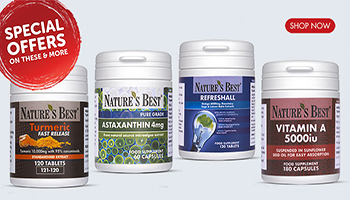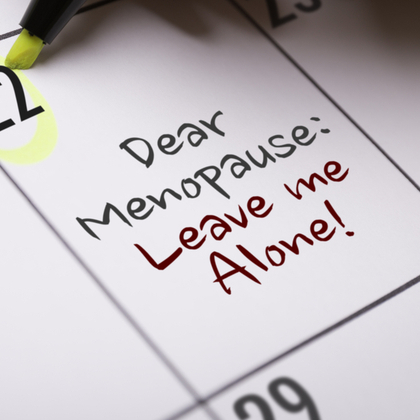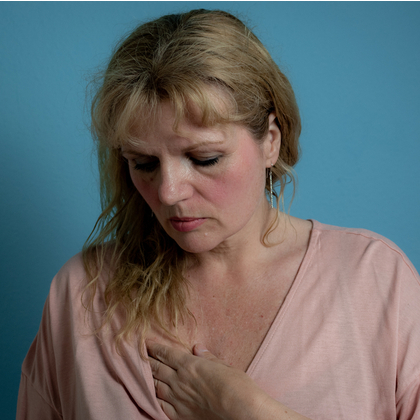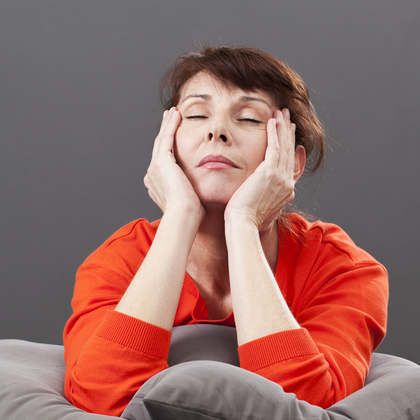
Many women find supplements a helpful tool to manage the symptoms associated with menopause. However, since every woman’s experience of the menopause is unique, your nutritional supplement regimen should be too. You should look closely at your symptoms to determine what vitamins, minerals and herbs to take.
What can I take for perimenopause?
The perimenopause is known as ‘around menopause’ and refers to the years leading up to the menopause, which can last between 4 and 12 years (1). Most women start to notice perimenopausal symptoms in their late 40s. Here are some recommended vitamins:
Soy Isoflavones
Research into phytoestrogens — powerful plant compounds that mimic oestrogen in the body — has gained huge traction in recent years.
 In clinical trials, phytoestrogens, like soy isoflavones, have demonstrated promise in reducing both night sweats and hot flushes (2). Also, research has reported a beneficial effect of soy isoflavones on mood symptoms and fatigue (3).
In clinical trials, phytoestrogens, like soy isoflavones, have demonstrated promise in reducing both night sweats and hot flushes (2). Also, research has reported a beneficial effect of soy isoflavones on mood symptoms and fatigue (3).
Since perimenopause is characterised by a sharp decline in oestrogen — which is linked to hot flushes, mood swings, , breast tenderness, , amongst other symptoms — phytoestrogens are thought to support women reaching menopause.
Gingko Biloba
You may experience brain fog and lapses in your short-term memory during the latter stages perimenopause. Other perimenopausal symptoms, like sleep issues, night sweats, hot flushes, anxiety, and depression, may also aggravate memory problems. Scientists believe that declining oestrogen and progesterone are responsible for cognitive difficulties (4).
There is some evidence to suggest the herb, Ginkgo Biloba, may have a rejuvenating effect on the brain, helping to maintain normal cognitive function and support memory in the short-term (5).
Sage
Though the exact causes of hot flushes remain unclear, scientists suggest that the perimenopausal fall in oestrogen may play a role in the development of vasomotor symptoms, like hot flushes and night sweats (6).
Sage is a member of the phytoestrogen family and has developed a reputation as a popular supplement for the menopause. One study reported that sage reduced the frequency and severity of hot flushes in perimenopausal women (7).
Valerian
Women also report sleep issues throughout the perimenopause, with sleep-disordered breathing, night sweats, and mood changes contributing to complaints. The perimenopausal lows of progesterone and, in particular, oestrogen, disrupt both sleep and waking performance.
Valerian root is a traditional herbal remedy used for the temporary relief of night-time disturbances and mild anxiety. One meta-analysis confirmed that 80 per cent of patients taking valerian had a greater chance of improving sleep quality compared to those taking the placebo (8).
PEA: (Palmitoyletanolamide)
PEA is the perfect partner for Valerian Root. PEA is an endocannabinoid-like compound found in almost every cell, tissue, and fluid in the body. Naturally produced when cells are damaged or threatened, PEA is a well-researched alternative to CBD. It’s a popular choice to support sleep hygiene, especially when rest is interrupted by any menopause-related discomfort.
Aside from 400mg of Palmitoylethanolamide, this formula includes vitamins B12, B6 and B1, all of which contribute to the normal functioning of the nervous system and normal psychological function, making it an even better addition for sleep in menopause.
St John’s Wort
The hormonal fluctuations — in particular, the sharp decline of oestrogen and progesterone — , and the array of challenging physical symptoms that characterise the perimenopause are known to contribute to mood changes, such as anxiety and depression.
St John’s Wort is a traditional herbal remedy used for the relief of mild anxiety and low mood. A meta-analysis of 27 trials revealed that St John’s Wort exhibited similar levels of effectiveness as selective serotonin reuptake inhibitors (SSRIs) in treating mild-to-moderate depression (9).
What vitamins should I take after menopause?
Postmenopause refers to the stage after menopause. At this point, many of the perimenopausal symptoms dissipate, but some concerns still linger, such as low bone mineral density and vaginal dryness.
Here are some recommended vitamins to take after menopause:
Calcium
For women, oestrogen plays a vital role in regulating bone production and turnover. However, as you enter postmenopause, oestrogen becomes deficient in the body, which can cause brittle bones as bone breakdown begins to exceed bone formation.
Research suggests that women may lose up to 20% of their bone density in the 5 to 7 years after menopause (11).
Calcium is critically important to maintain normal bone health. And yet, high levels in your diet are no guarantee that calcium is being properly utilised. You also need vitamin D, magnesium, and vitamin K to support the absorption of calcium and safeguard bones.
For healthy bones in postmenopause, choose a multivitamin that delivers around 250-500mg of calcium.
Vitamin D
Vitamin D is essential for the maintenance of normal bone health since it aids the regulation of calcium in the blood and without a sufficient amount your body cannot absorb calcium. Studies suggest that postmenopausal women with lower vitamin D reserves are more prone to fractures (12).
For optimal bone health after the menopause, aim for 25µg of vitamin D daily.
Magnesium
Magnesium is hugely important for bone health as it helps to process calcium, but it also plays a role in converting vitamin D to its active form (13). To protect against postmenopausal osteoporosis, find a multivitamin that supplies around 250mg of magnesium.
Vitamin K2
Vitamin K2 also helps to support bone health in postmenopause. Vitamin K is primarily known for making osteocalcin — a protein largely found in bones that helps to harden calcium. Look for 90µg in a bone-health multivitamin.
Sea Buckthorn Berry Oil
Falling levels of oestrogen may lead to vaginal dryness, which can become more pronounced in postmenopause (14). Around 58% of postmenopausal women report vaginal discomfort (15).
Sea buckthorn is widely praised for its rich Omega 7 essential fatty acid content which helps to support the reduction of intimate dryness (16).
To learn more about supporting your health in menopause, please visit the rest of our Menopause hub.
References:
-
nhs.uk. 2020. Menopause – Symptoms. Available online: https://www.nhs.uk/conditions/menopause/symptoms/
-
Upmalis D. et al., Vasomotor symptom relief by soy isoflavone extract tablets in postmenopausal women: a multicenter, double-blind, randomized, placebo-controlled study. Menopause. 2000;7(6):422.
-
Liu Y. et al., In vivo anti-fatigue activity of sufu with fortification of isoflavones. Pharmacognosy Magazine. 2014;10(39):367.
Atteritano M. et al., Genistein effects on quality of life and depression symptoms in osteopenic postmenopausal women: a 2-year randomized, double-blind, controlled study. Osteoporosis International. 2013;25(3):1123-1129.
-
Shulman L. et al., Menopause-associated Symptoms and Cognitive Performance: Results From the Study of Women's Health Across the Nation. Yearbook of Obstetrics, Gynecology and Women's Health. 2010;1357-359.
-
Silberstein R. et al., Examining Brain-Cognition Effects of Ginkgo Biloba Extract: Brain Activation in the Left Temporal and Left Prefrontal Cortex in an Object Working Memory Task. Evidence-Based Complementary And Alternative Medicine. 2011;1-10.
-
Freeman R. Menopausal hot flashes: Mechanisms, endocrinology, treatment. The Journal of Steroid Biochemistry and Molecular Biology. 2014;142:115-120.
-
Bommer. S, Klein. P, Suter. A. First time proof of sage’s tolerability and efficacy in menopausal women with hot flushes. Advances In Therapy. 2011;28(6):490-500.
-
Bent S. et al., <span itemtype="http://schema.org/Organization" itemscope="" itemprop="name Valerian for sleep: a systematic review and meta-analysis. The American journal of medicine. 2006;119(12):1005-1012.
-
Venkatanarayanan . NQ., Ho C., Clinical use of Hypericum perforatum (St John's wort) in depression: A meta-analysis. Journal of Affective Disorders. 2017;210:211-221.
-
nhs.uk. 2020. Menopause – Symptoms. Available online: https://www.nhs.uk/conditions/menopause/symptoms/
-
nhs.uk. 2020. Menopause and your bone health. Available online: https://www.nhs.uk/live-well/healthy-body/menopause-and-your-bone-health/
-
Bener. A., Saleh A., Low vitamin D, and bone mineral density with depressive symptoms burden in menopausal and postmenopausal women. Journal of Mid-life Health. 2015;6(3):108.
-
Castiglioni S. et al., Magnesium and osteoporosis: current state of knowledge and future research directions. Nutrients. 2013;5(8):3022-3033.
-
Pulse Today. 2020. Genitourinary Syndrome Of The Menopause. Available online: http://www.pulsetoday.co.uk/clinical/clinical-specialties/womens-health/genitourinary-syndrome-of-the-menopause/20039579.article
-
(15) Women's Health Concern. 2020. Vaginal Dryness. Available online: https://www.womens-health-concern.org/help-and-advice/factsheets/vaginal-dryness/
-
Larmo P. et al., Effects of sea buckthorn oil intake on vaginal atrophy in postmenopausal women: A randomized, double-blind, placebo-controlled study. Maturitas. 2014;79(3):316-321.
Disclaimer: The information presented by Nature's Best is for informational purposes only. It is based on scientific studies (human, animal, or in vitro), clinical experience, or traditional usage as cited in each article. The results reported may not necessarily occur in all individuals. Self-treatment is not recommended for life-threatening conditions that require medical treatment under a doctor's care. For many of the conditions discussed, treatment with prescription or over the counter medication is also available. Consult your doctor, practitioner, and/or pharmacist for any health problem and before using any supplements or before making any changes in prescribed medications.
Related Posts

Olivia
Olivia Salter has always been an avid health nut. After graduating from the University of Bristol, she began working for a nutritional consultancy where she discovered her passion for all things wellness-related. There, she executed much of the company’s content marketing strategy and found her niche in health writing, publishing articles in Women’s Health, Mind Body Green, Thrive and Psychologies.
View More



